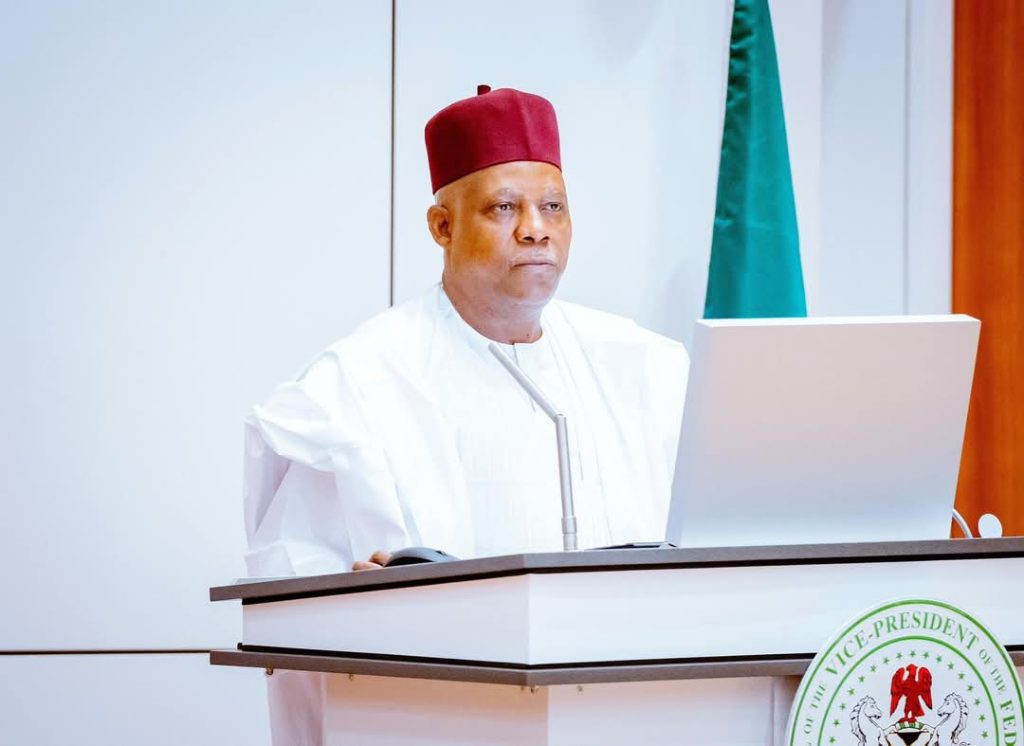By Johnbosco Agbakwuru
ABUJA — THE Vice President, Senator Kashim Shettima, has made case for holistic food security, saying it would require collective action both at the continental and global level.
Shettima, who is currently attending the United Nations Food Summit in Ethiopia, said countries should have a shared purpose and determination as far as food provision was concerned.
Butressing his advocacy, he said Africa needed predictable concession finance to invest in agriculture, rural transformation, infrastructure and literacy, while climate finance must be aligned with the food system.
Senator Shettima said Nigeria was scaling its agricultural drive with modern technology such as Artificial Intelligence, AI, geospatial analytics and satellite-driven climate intelligence to end food insecurity in the country.
The Vice President joined other African leaders at the opening session of the United Nations Food Systems Summit Stocktake (UNFSS+4) in Addis Ababa, the capital of Ethiopia, yesterday.
He said the target was to ensure a future that was anchored in abundance, equity, and human dignity.
“The Fourth Industrial Revolution has not only disrupted the old order but gifted us instruments that were once confined to the imagination. Artificial intelligence, geospatial analytics, and satellite-driven climate intelligence are now part of our agricultural vocabulary.
“We are deploying these tools to monitor production, enhance transparency, connect producers to markets, and reduce waste across the value chain,” Shettima declared.
Instead of diplomatic pleasantries, the Nigerian Vice President urged participants at the summit to leave the event with a conviction that Africa would succeed, even as he urged African nations to rise with a shared purpose and determination to make the continent food secure.
“A broken food system in any part of the world diminishes the dignity of humanity as a whole. Let us rise with a shared purpose. Let us build a world where no child sleeps on an empty stomach, where no farmer is forgotten, and where food is not a luxury but a human right,” he stated.
Shettima noted that Nigeria had also pursued institutional reforms robustly, including deepening partnerships across sectors and prioritising agro-industrialisation as a key driver of inclusive growth.
This, he explained, followed the unveiling of the nation’s National Food Systems Transformation Pathway, leading to the rollout of targeted investments in infrastructure and human capacity.
On his part, the Prime Minister of Ethiopia, Dr Abiy Ahmed, described the summit as a moment to take stock and renew a shared commitment to building food systems that were resilient and inclusive.
Ahmed said Africa needed predictable concession finance to invest in agriculture, rural transformation, infrastructure and literacy, adding that climate finance must be aligned with the food system “because hunger and environmental degradation are deeply linked.”
“Globally, food systems are facing immense pressure from planning stock, shocks, conflicts, inequalities and economic destruction. At the same time, development assistance has declined in multilateral cooperation. These challenges threatened production, supply and dignity in the subregion nations.
“Yet, in this context, the human spirit and our shared resolve to act remain strong. In Ethiopia, we have made a deliberate choice to act boldly, to think holistically and to place human dignity at the centre of our food system transformation. We are investing in local production, reducing dependency on imports and building a resilient system that serves our people and our future,” the prime minister said.
In his remarks, the Secretary-General of the United Nations, António Guterres, who spoke through a recorded videocast, noted that food systems were about more than food, saying they included climate, justice and the right to a better future.
“Since the last food summit, we have seen progress. We are committed to food systems that are inclusive, sustainable, equitable, resilient and built on human rights, but progress is not fair enough. Global hunger is rising, and threats, shocks are pushing the prices of food.
“The Gross Domestic Product, GDP, of the African continent is not just a crisis of scarcity, it is a crisis of justice, equity and climate. Climate change is destroying harvests, supply chains and humanitarian response,’’ he said
The post UN Summit: Combating food insecurity requires collective action — Shettima appeared first on Vanguard News.

